BSC Expectations

Participation in the BSC is a very active and engaging process. The BSC requires commitment to an extensive program involving readings, trainings, team meetings, and check-in calls with CJJR, CCLP, and other site teams, as well as a week-long Certificate Program (in Washington DC) and three in-person Learning Sessions (location TBD). The BSC methodology empowers all team members to create and test ideas for system improvement that over time can develop into large-scale systemic changes. The following chart identifies the two types of teams that communities will create and the tasks related to participation in the BSC.
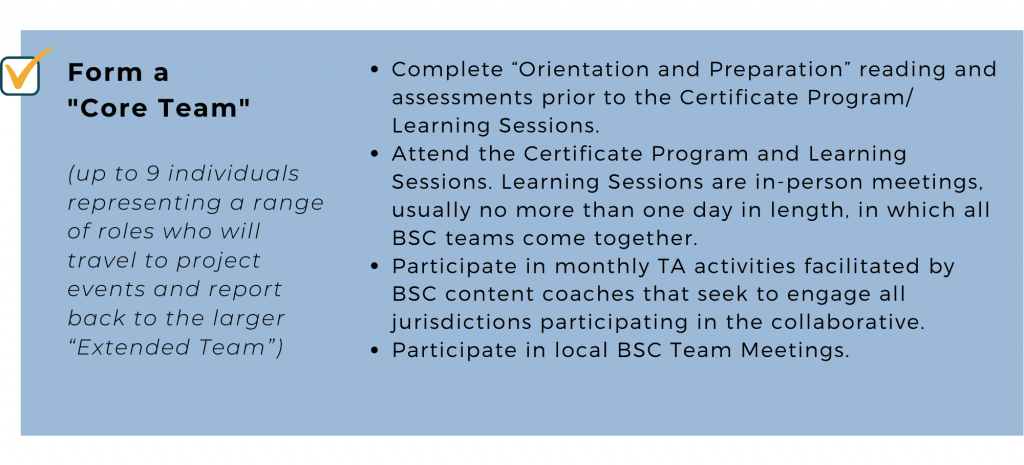
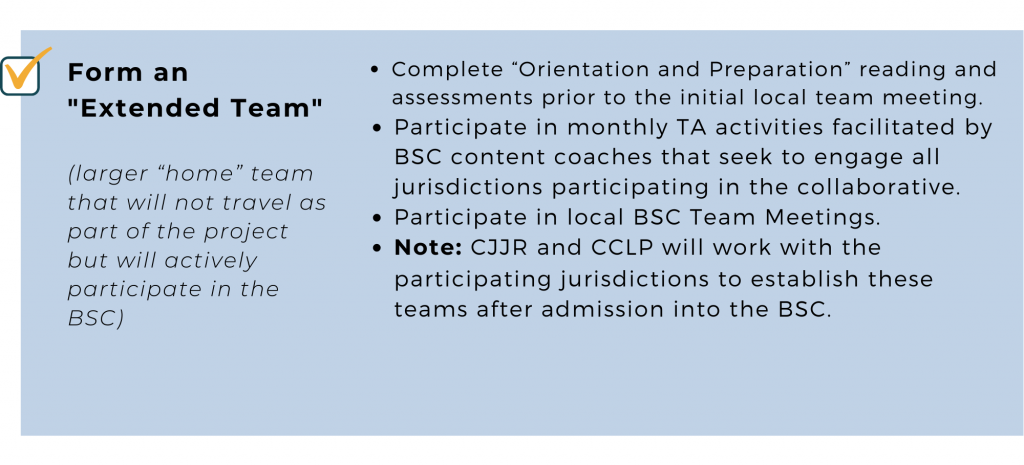
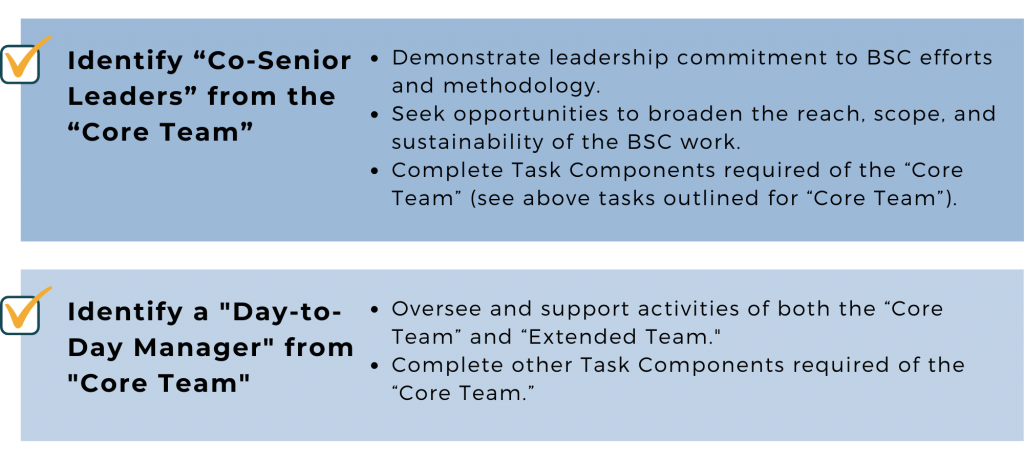
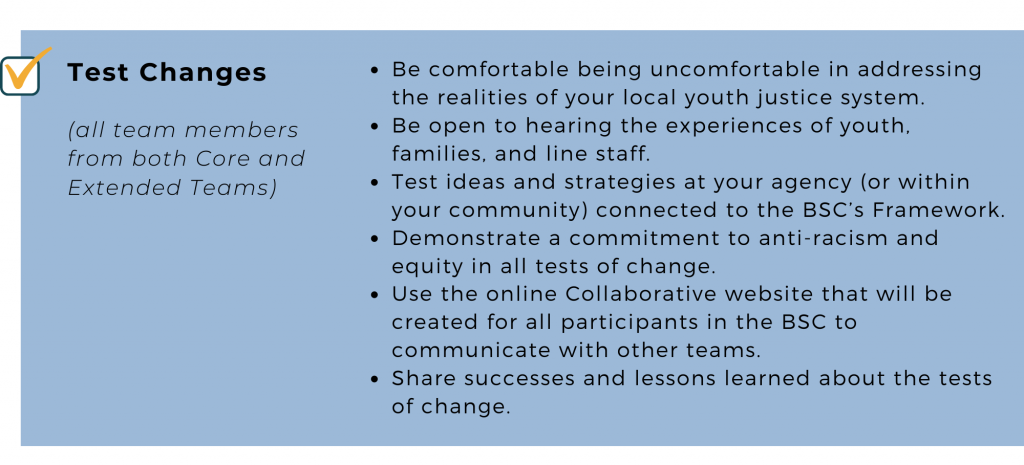
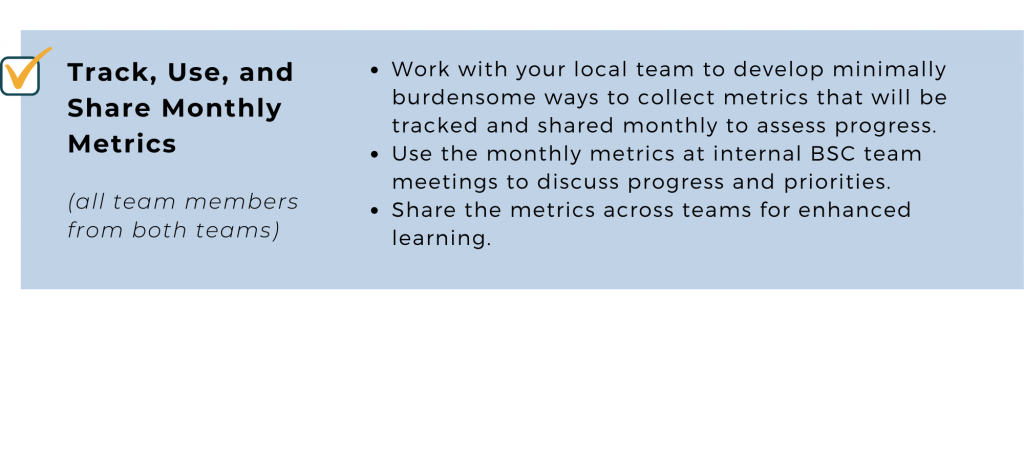

The ability to collect, analyze, and share meaningful data is vital to understanding the depth of disparity currently within systems, and the data that teams collect will guide them as they transform their youth justice systems. To demonstrate the scope of racial and ethnic disparities in their youth justice system, applying teams are asked to provide baseline data, using readily available data sources, to describe current racial and ethnic disparities in their jurisdiction. This includes providing basic statistics and demographic information of youth at key decision points within the jurisdiction’s youth justice system. In addition, jurisdictions will need to identify the specific mechanism or system that pushes or pulls youth disproportionately into the youth justice system, as this system or mechanism will become an area of focus for that particular site. For more specific guidance on the data applicants will need to provide, see the BSC Application Packet here.
Once selected, teams participating in this BSC will be expected to collect and share agreed upon metrics with CJJR and CCLP at monthly intervals. These monthly metrics derive from the six components of the BSC and may represent both process and outcome measures associated with the project. Potential metrics may include:
The number of youth and their families who are included in planning and decision making about their own lives
The number of youth and their families who report being treated with respect by system staff
- The number of case plans indicating referral to community providers
- The number of community providers partnering with the youth justice system
- The number of youth suspended (in school or out of school), or expelled and referred to the youth justice system
- Then number of youth referred to the youth justice system that are concurrently involved in the child welfare system.
- The number of youth having their case dismissed at intake
- The number of youth diverted from formal system involvement and into community based programs
- The number of cross-system MOUs, protocols, or agreements that speak to coordination across systems
Teams will be expected to disaggregate measures by race, ethnicity, gender, and other demographic and geographical data to ascertain the impact of change on youth of color in various areas within the jurisdiction.
In addition to monthly metrics, this BSC includes an evaluation component in which data will be gathered to explore the utility of small tests of change and their expansion into sweeping, system-level change. The evaluation is twofold and seeks to determine the impact of the BSC process to drive change on this topic, as well as the impact of the concrete strategies and approaches implemented to transform systems for youth of color. The evaluation will require capturing a subset of variables both on the changes that teams are seeing in practice as a result of their BSC participation, as well as variables that speak to the BSC methodology. Teams will work closely with CJJR and CCLP to determine appropriate measures that speak to their jurisdictional-specific outcomes.
To carry out this evaluation, each jurisdiction will share evaluation and BSC- specific data with CJJR and CCLP. All selected teams will be required to sign a Data Use Agreement to confirm their jurisdiction’s ability to share aggregate level, de- identified data with the BSC project team. The Data Use Agreement will provide guidance on the type of information to be shared, with whom the data will be shared (Georgetown University), and how the data will be stored and used. As part of the BSC Application, teams will be asked to provide a statement indicating their jurisdiction’s willingness to seek permission for completion of the agreement.
